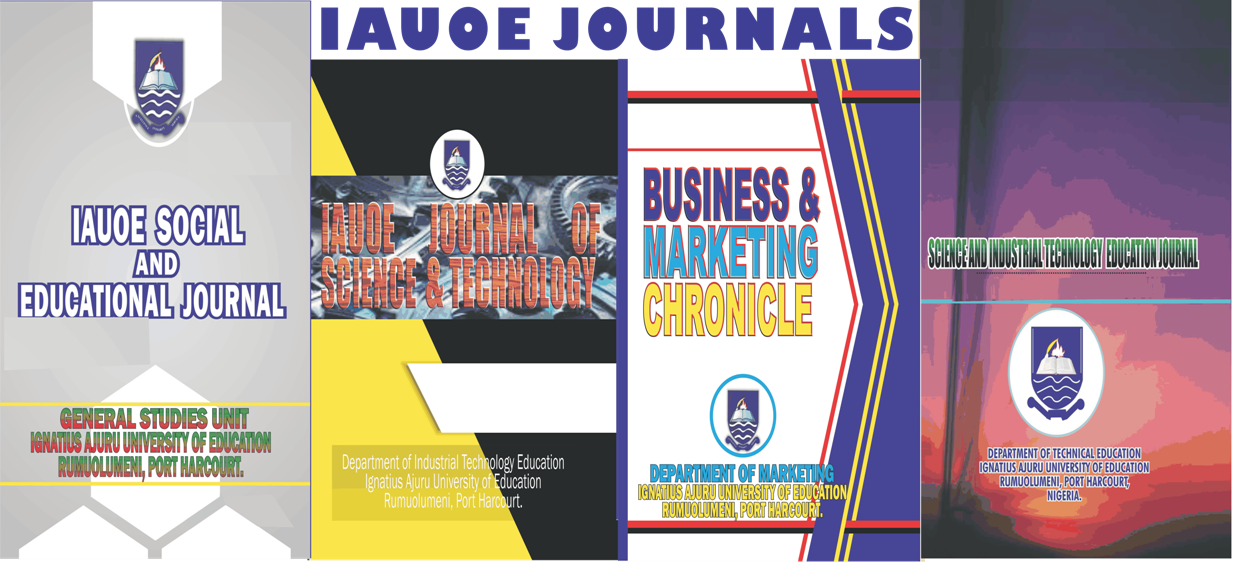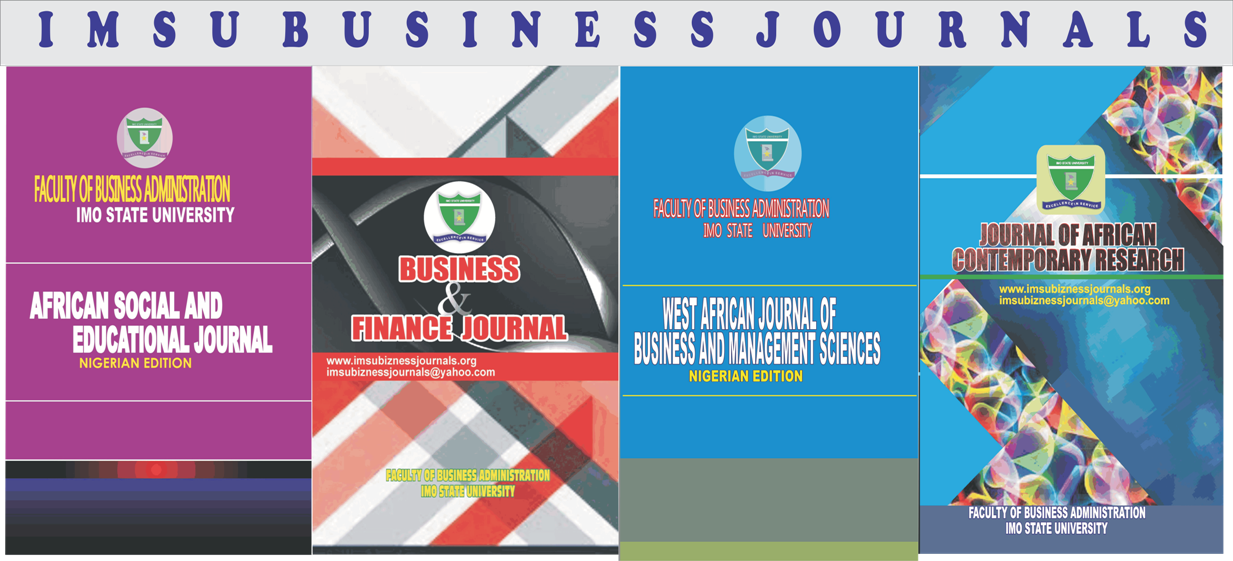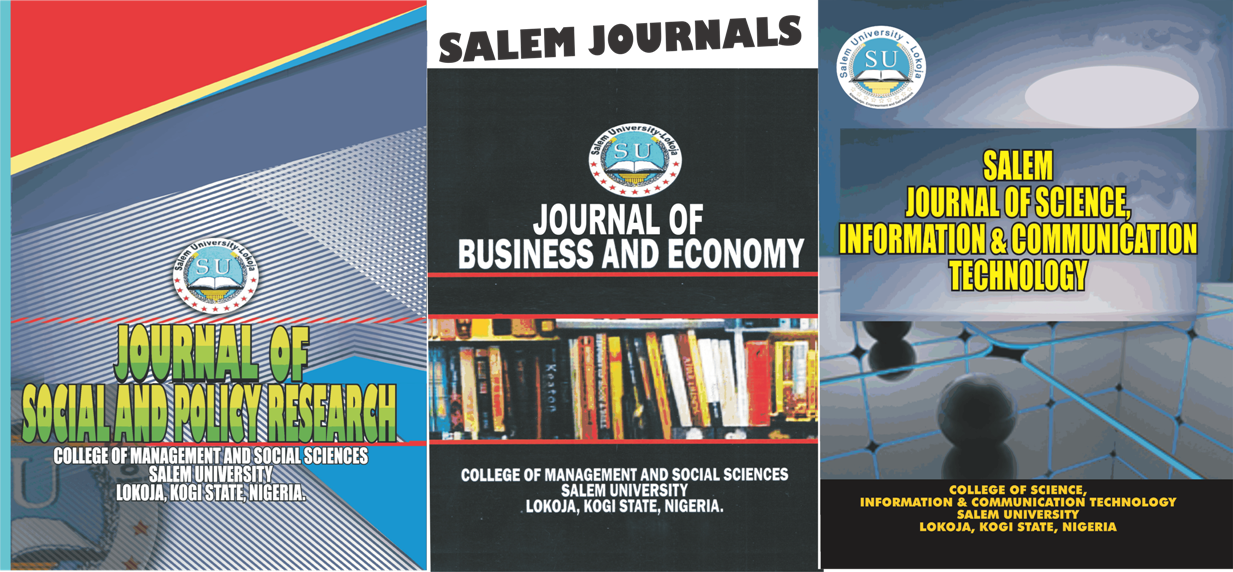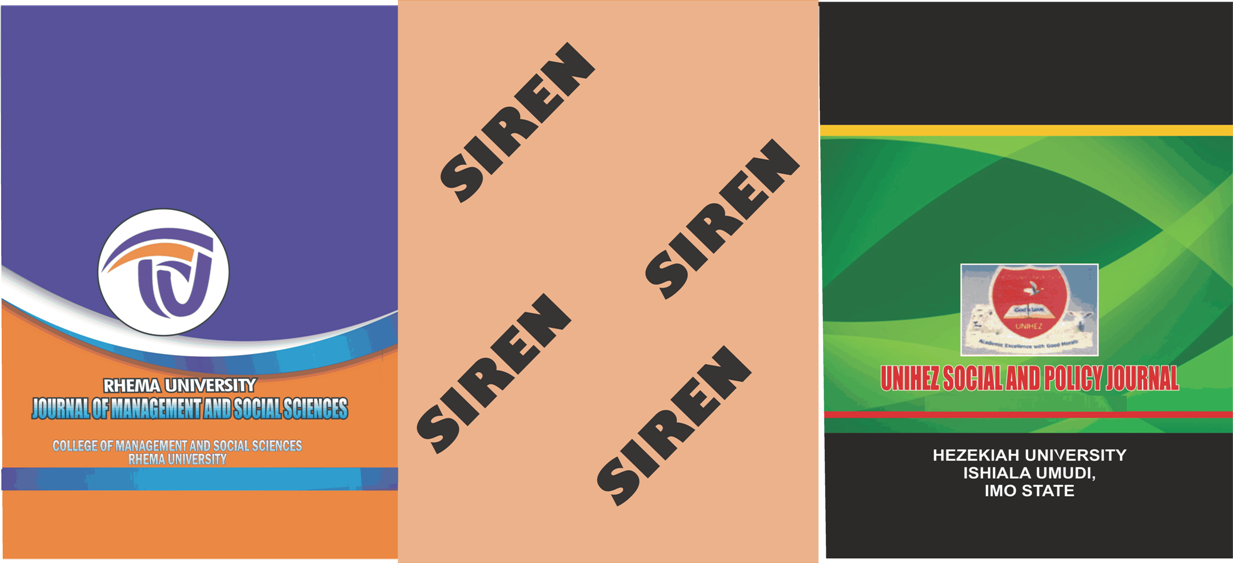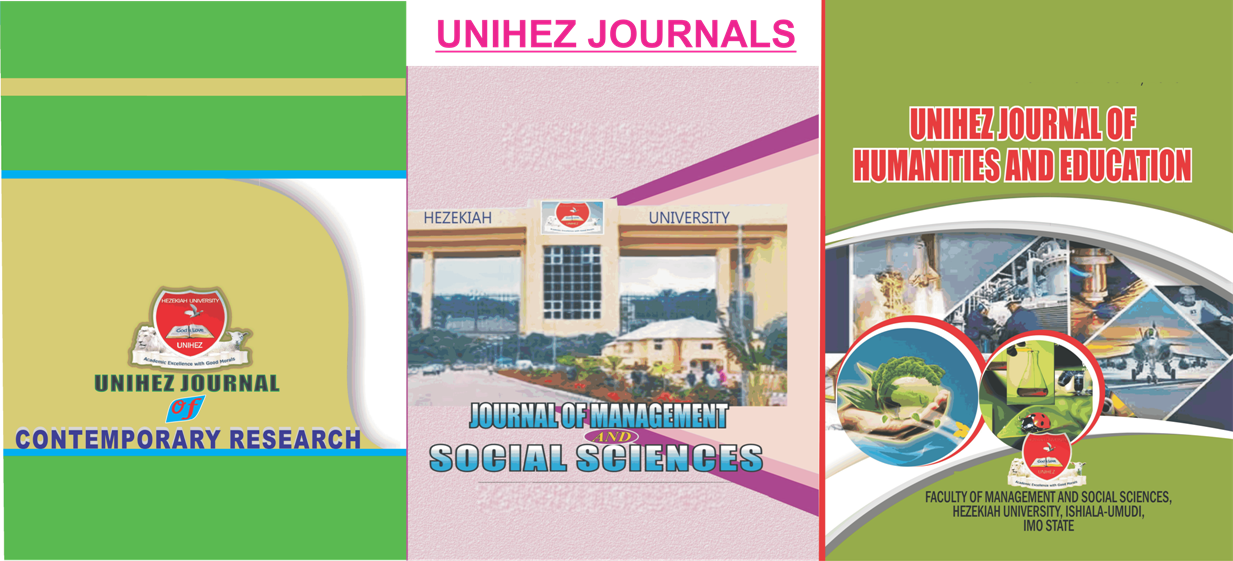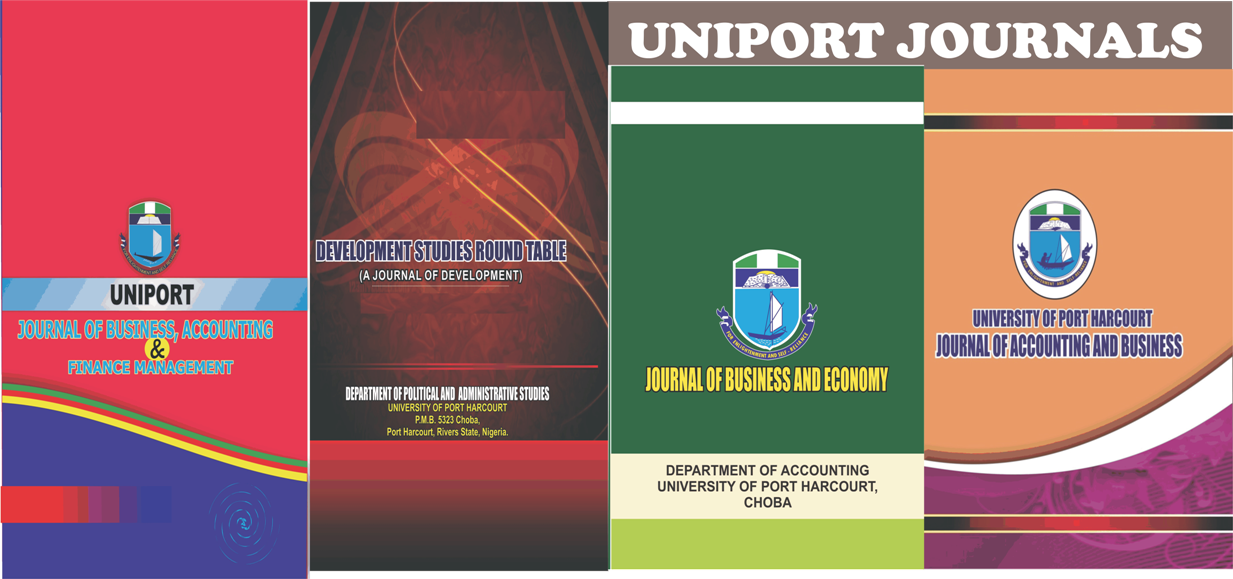2018 Archive
| 1 |
Title: ENTREPRENEURSHIP AND UNEMPLOYMENT REDUCTION IN NIGERIA THE ROLE OF STAKEHOLDERS.pdf Author: N. H. Akpanabia, PhD. Abstract: This study has examined the Entrepreneurship and unemployment reduction in Nigeria: the role of stakeholders. The study is carried out to identify the major challenges of entrepreneurship in line with stakeholders role. Four research objectives guides the study. The data are collected through secondary sources – textbooks, journals and online publications. The researcher employs structural functional theory to analyze the subject matter. In line with literature sources, the study discovers that the government, educational institutions, the family and financial institutions have significant roles to play in encouraging entrepreneurship so as to reduce unemployment. But, it is unfortunate that the above stakeholders are not playing their functions as it ought to be and that is the reason for the high level of unemployment in the Nigerian society. This study therefore recommends that the Nigerian government at all levels, the educational institutions, the financial institutions and the family – as the major stakeholders – should play significant positive roles in encouraging entrepreneurship so as to reduce unemployment in our system; hence the study concludes that stakeholders’ encouragement of entrepreneurial venture in our society will drastically reduce unemployment in our system. Key Words: Entrepreneurship, Unemployment, Stakeholders, Government, Financial Institutions, Educational Institutions and Family. View |
| 2 |
Title: FOREIGN EXCHANGE RATE AND PERFORMANCE OF THE NIGERIAN MANUFACTURING SECTOR.pdf Author: Osuji Abstract: This study examined the impact of foreign exchange rate on performance of the manufacturing sector in Nigeria. The study spanned from 1991-2017 The independent variables used for the study are real effective exchange rate, parallel exchange rate, interest rate, inflation rate, money supply while the dependent variable is returns on equity for fifteen manufacturing firms in Nigeria. Time series data were used and gotten from CBN Statistical Bulletin 2017 and annual report of the firms under study. The study applied E-view 7.0 version and the estimation technique applied are ordinary least square (OLS), diagnostic test, serial correlation test, stability test, unit root test, granger causality and co integration test. The result revealed the p-value of real effective exchange rate (REER) is 0.036, parallel exchange rate (PER) is 0.000, interest rate (INT) 0.031, inflation rate (INF) 0.000, money supply (MSP) 0.017. The result also revealed that all the independent variables under study have significant impact on returns on equity of manufacturing firms in Nigeria because their p-values are all less than 5% significant level. The normality test suggest that the series distribution is normal as the p-value is 0.3 89 which is greater than 5% significant level, we accept H0 which states that the residuals are normally distributed and it is desirable and further connote that the influence of other omitted and neglected variables is small and at best random. While serial correlation test shows that the p-value of the f-statistics is 0.122 which is greater that the critical value of 5%, we conclude by accepting H0 that there is no presence of serial correlation which is desirable and implies that the variables are independently distributed. The study recommended that the monetary authority should continue to initiate policies that will stabilize exchange rate and remove negative effect of exchange rate fluctuations on Nigeria’s manufacturing performance. Keywords: Exchange Rate, Real Effective Exchange Rate, Interest Rate, Money Supply View |
| 3 |
Title: IMPACT OF ENTREPRENEURSHIP ON ECONOMIC GROWTH IN NIGERIA.pdf Author: CHIMA, AMBROSE NDUBUISI Abstract: This paper examines the impact of entrepreneurship on economic growth in Nigeria. It also discusses the evolution and current development of principles and practice of entrepreneurship in Nigeria. The methodology adopted ps the 5-point Likert Scale and mean average in analyzing the raw data collected through survey, data related to entrepreneurship on economic growth in Nigeria. However, interviews are also conducted. Entrepreneurship has contributed significantly to Nigerias economy growth, Entrepreneurship pervaids Nigeria Business environment and government policies to survival and growth rate. It was also found that entrepreneurship can enhance economic growth primarily by generating employment and foster the growth of micro, small and medium enterprises in Nigeria. We recommend that there should- be proper policy coordination and policy stability; reforms in the educational curriculum to prepare students for self-reliance; and fixing the power sector-Nigerias basic infrastructure. When we have flourishing Micro, Small and Medium Enterprises (MSMEs), gainful employment will be created, wealth created will be distributed evenly and economy is developed. Keywords: Entrepreneurship, Economic Growth, Environment, Wealth Creation. View |
| 4 |
Title: THE ROLE OF HOTEL INDUSTRY TO NIGERIA TOURISM DEVELOPMENT A MEDIUM FOR MANAGING NIGERIAN ECONOMY.pdf Author: OKAFOR OBIEFUNA ANENE, PhD. Abstract: This paper IS designed to x-ray the role of the hotel industry in Nigeria tourism development. The essence of the hotel industry to the development of the Nigeria economy is discussed in the area of hospitality, creation of job opportunities, urban/city development, source of income to the government, gateway to the Nigeria tourist sites and foreign exchange. Conceptual issues on tourism and National development are also discussed. It concludes that, to attain national development through tourism, government should encourage, educate, train, promote and develop all sectors so as to make it attractive to the local people, the hotel industry and the world in general. The paper recommends unalloyed support of the government and maximum attention to development of hotel industries and tourism sites in Nigeria. View |
| 5 |
Title: FINANCIAL INTERMEDIATION AND ECONOMIC GROWTH OF NIGERIA.pdf Author: Okere, Uzowuru & Mbanasor Abstract: This paper evaluates the relationship between financial intermediation and economic growth of Nigeria (1981-2016). Secondary data are sourced from CBN statistical bulletin and Bureau of Statistics. Hypotheses are formulated and tested using vector error correction model (VECM) and the test for stationarity proved that the variables are integrated in 1(1) order which implies that unit roots do not exist among the variables. There is also long-run equilibrium relationship between the variables and the result of VECM confirmed about 45 percent short-run adjustment speed from long-run disequilibrium. The coefficient of determination indicates that about 99 percent variations on economic growth are explained by the changes in financial intermediation variables in Nigeria. The result also shows that bank savings deposit, bank total credits and time deposit have significant impact on the economic growth of Nigeria. This paper therefore recommends that there should be a working regulatory framework that will enable and ensure that banks channel their resources to the most viable sector of the economy and also ensure or enforce total compliance that the funds so far advanced are used for the purpose in which they are approved for. Again, government should endeavour to provide the basic infrastructures/amenities like constant power supply, good accessible road and security. This will reduce the cost of production and thereby reducing the price of goods and services in Nigeria. Keywords: Deposit Money Bank, Economic Growth, Financial Intermediation. View |
| 6 |
Title: SERVICE CULTURE AND PROFITABILITY IN NIGERIAN HOSPITALITY INDUSTRIES-A TOOL FOR ECONOMIC SUSTAINABILITY IN NIGERIA (A STUDY OF SELECTED HOSPITALITY ESTABLISHMENTS)..pdf Author: Ifegbo & Otene Abstract: Continuous offer of high quality service is extremely important in achieving consumer satisfaction which positively impacts on the profitability of hotels. In this current period of economic recession in Nigeria when the oil and gas sectors are contributing poorly to the nation’s purse, government, in partnership with private sector, can upgrade the service offer of the hospitality Industry to increase itsr profitability and subsequently generate more revenues from the sector. This becomes essentially important particularly in this period of upsurge of hotel business. In this study of service culture and profitability in Nigerian Hospitality Industry, the researchers set out to investigate the service culture of Nigerian hotels, whether they truly deliver personalized services expected by customers in today’s competitive arena, how these can contribute to profitability of the industry, and most importantly help to address the current state of economic recession in the country. Selected hotels in Nigeria are used for the study. These include: Concorde Hotels, Owerri; Ikeja Capital Hotel, Lagos; Benue Metropolitan Hotel and Resorts, Markurdi; Sheration Hotel, Abuja and Prince Hotel, Kano. The researchers adopt survey descriptive method of research and collected data using structured questionnaires. Data analysis is carried out using simple percentages and the hypotheses are tested using chi-square (x2) statistical techniques. The results reveal that hotel operators in Nigeria are not sufficiently aware of the importance of effective service culture in their organizations. They also show that some of the required steps needed to nurture good service culture, such as staff training, employee empowerment, customer feedback mechanism and customer friendly policies are virtually lacking in some Nigerian hotel management. The results also reveal that positive service cultures capable of contributing significantly to the profitability of hotel business, as well as boosting the economy of the nation, were rarely adopted. It is concluded that service culture in most Nigerian hotels is substandard and this has negatively impinged on their level of profitability. Since it is obvious that the hospitality industry has high potential for revenue generation, the government could subsidize the private sector in funding the training and workshop participation of employees in the hospitality industry in order to make this realizable. Keywords: Service Culture, Profitability, Hospitality, Establishments and Economic Sustainability. View |
| 7 |
Title: BUDGET PADDING AND THE NIGERIAN ECONOMIC GROWTH.pdf Author: Yikarebogha & Umeaka Abstract: This study examines budget padding and the Nigerian economic growth with the objective of establishing if budget padding has any significant relationship with the economic growth of Nigeria since it is the desire of every government to grow its economy. To achieve this, data are obtained from the Securities and Exchange Commission (SEC) and the Central Bank of Nigeria (CBN) statistical bulletin. Through the use of E-view, regression analysis is used to ascertain if there is a relationship and T-test analysis to determine the kind of relationship that exists between budget padding and economic development respectively. The result shows that there is a positive and significant relationship between budget padding and economic growth. We therefore reject the Null hypothesis and accept the Alternative, concluding that there is a significant relationship between budget padding and economic growth. The study recommends therefore among others, that the roles by all parties involved in the budgetary process be clearly defined with constitutional backups, that in the case of conflict, duplication or misconception of roles, the court should be called upon for proper interpretation of the rules, the issue of secrecy should be done with and that alterations made by the National Assembly be made public by them. Keywords: Budget, Budget padding, Economic Development View |
| 8 |
Title: PRIVATE SECTOR AND AGRICULTURAL MARKETING A PANACEA TO MANAGING NIGERIAN ECONOMY BEYOND RECESSION.pdf Author: IBEKWE CHIGOZIE FRANCISCA, PhD. Abstract: Agriculture in Nigeria has continued to experience dwindling fortunes for some decades owing to neglect of the sector occasioned by the oil boom. This is because a government centred approach to agricultural marketing was incapable of sustaining the tempo of growth experienced in the 60s and 70s. The rural sector with its many constraints is responsible for more than 90 percent of food consumed in the country. With a rapidly increasing population, food production cannot match up with population growth. The result is a shortfall in food supply. In the light of the ban on imports including agricultural products, the activities of agro allied firms sourcing locally for raw materials is compounding the current agricultural marketing through food crisis by buying off almost all available grains without necessarily contributing anything to its production. The corollary is that only little is left for food consumers with attendant spiraling of grain prices. This paper believes that if efficient and effective agricultural marketing is not properly employed and managed, the emergence of more such firms could further exacerbate the hunger problem. The involvement of the private sector in direct agricultural marketing will go a long way to redress this anomaly. Keywords: Marketing, Agriculture, Private Sector, Nigerian Economy. View |
| 9 |
Title: ANALYSIS OF STUDENTS’ ATTITUDE TOWARDS ONLINE SHOPPING A SURVEY IN THE UNIVERSITY OF UYO NIGERIA.pdf Author: Agu, Ogbuji & Ata Abstract: This study uses the ABC, TAM and the Triple Ten models to analyze the attitude of University of Uyo students towards online shopping. Using the 2017/2018 academic session admission statistics of the University, the Taro Yeman formula is applied to arrive at a sample size of 386 students for the study. Based on the responses of 304 respondents, our SPSS Multiple Regression output reveals that a strong, positive and significant relationship exists between attitude and online shopping intention. Further analysis shows that affective disposition (t=8.515; p=0.000) and cognitive disposition (t=9.438; p= 0.000) are significant predictors of online shopping intention, while the behavioural tendency (t=1.517; p=0.087) is not. The study recommends that issues as delay in delivery of purchased product and e-fraud should be tackled to ensure that the behavioural (action) component of students’ attitude towards online shopping is aligned with the feelings (affective) and the knowledge (cognition) components for a balanced attitude. It also recommends the adoption of the triple ten models for e-tailers in Nigeria among others. KEY WORDS: Online shopping, Attitude, TAM, ABC, Triple Ten. View |
| 10 |
Title: QUALITY ASSESSMENT OF BOREHOLE WATER IN NIGERIA AND ITS FINANCIAL IMPLICATIONS.pdf Author: Ojiegbe, Duruchi, Onyenchere & Nwachukwu Abstract: Water is a valuable resource to man. It has in recent years become one of the central themes of environmental, economic and social debates. Boreholes represent a major source of drinking water supply for most urban and rural areas in Nigeria. Considering its continued proliferation, it becomes necessary to examine the issue of water quality assessment and the financial implications of these boreholes. Experts believe that water from these boreholes are polluted as they are not adequately treated before consumption. This study employs the bibliographical approach, where in it analyzes the references that support the study. The analysis shows that there is no borehole water in any environment in Nigeria that is automatically safe, as the cost implications of getting a completely safe borehole is not within the reach of an average Nigerian. This reaffirms the need for a continued effort at investigating the quality of borehole water nationwide in order to ascertain the nature of water being consumed by the people. It recommends water quality assessments which employ mathematical models and statistical techniques such as water quality index, because most previous studies did not employ it. Water quality index does not only describe the behavior of the water quality indicators, it also allows for estimates and of future scenarios. Such analysis can be of great importance in the management of water resource, as well as in the formulation and implementation of national and state water policies. View |
| 11 |
Title: CBN’S FOREIGN EXCHANGE POLICY AND REINSURANCE BUSINESS IN NIGERIA A CHOW BREAKPOINT TEST APPROACH.pdf Author: Egbulonu, Dim & Duru Abstract: This research work focuses on the New Central Bank of Nigeria (CBN’s) Foreign Exchange Rate policy and its impact on Reinsurance Business in Nigeria using the Chow test for Structural Break point approach. The period of study covers January 2010 to December 2017 (96 months). Using monthly data on Reinsurance Business Profit Portfolio (converted to monthly series using Linear conversion method) as the dependent variable and Foreign Exchange Disbursement to Reinsurance Companies and Foreign Exchange Rate as the independent variables, the analysis finds no long run relationship amongst the variables. The breakpoint period is identified in January 2017 owing to the New CBN FX policy issue guide line which took effect in the first quarter of 2017. The Chow test reveals that the CBN’s FX policy caused a significant structural break in Reinsurance business Profits decreasing it by 643units as against the prior increase in Reinsurance Profits by 22.67 units before the new policy. Also, the analysis finds a positive effect of FX disbursement and Exchange rate on Reinsurance Profits but with less than 1unit coefficient which is deemed insufficient. Based on the findings, this research recommends among other things, that CBN should ensure increased Foreign Exchange disbursement to Reinsurance Companies in Nigeria so as to increase their risk carrying capacity as well as Reinsurers developing a defensive strategy against the effects of the New FX policy by strengthening their market risk solvency capital requirements. Keywords: Chow test, Structural Break, Reinsurance, Foreign Exchange (FX), FX Disbursements. View |
| 12 |
Title: DOWNWARD COMMUNICATION A CHALLENGE TO EMPLOYEE PERFORMANCE (A STUDY OF SELECTED ORGANIZATIONS IN IMO AND ABIA STATES).pdf Author: UDOKWU, ETHEL-ROSE B., PhD Abstract: Downward communication; a challenge to employee performance, is a research aimed at examining how downward communication can adversely affect the performance of employees. The basic variables of the study are job instruction, disciplinary action, employee productivity, commitment and work qualities which the specific objectives are derived from. The methodology of the study involves a stratified sampling of two hundred and eighty (280) subjects from ten conveniently selected organizations in Owerri, Imo State and Aba, Abia State. Analysis of the data is by Pearson multiple correlation and the result shows a negative relationship between job instruction and employee productivity (r=-0.608), employee commitment (r= -0.597) and work quality has a positive relationship with job instruction (r= 0.692); similarly, disciplinary action is found to have a negative relationship with productivity (r= -0.773); work quality (-0.675) and commitment (r= -0.682). Based on these findings; it is recommended that, In handling instructions down to subordinates, managers should avoid the use of harsh language in order not to demoralize (and hence de-motivate) the employees among other recommendations Keywords: downward communication, Job instruction, Disciplinary action, productivity, commitment and work quality. View |
| 13 |
Title: WORKING CAPITAL MANAGEMENT AND PERFORMANCE OF DEPOSIT MONEY BANKS EVIDENCE FROM NIGERIA.pdf Author: ONUORAH, A.C., PhD. Abstract: The study investigated working capital management and the performance of deposit money banks in Nigeria. The time series data collected from the statement of audited financial statement and annual report and accounts of the banks under study from 2010 – 2017 were estimated using SPSS 22.0 version. The findings revealed a strong positive and statistically significant relationship between CAT, CLY, NWC, and ROA. The study concluded that working capital in these five (5) deposit money banks will be managed within the period of study and has improved the profitability of the banking sector in Nigeria and working capital variables CAT, CLY, and NWC were seen to have significantly weighted on the performance of the deposit money banks under study except for UBA. The study, therefore, recommended that serious attention should be channel to the working capital of the banks under study so as to uphold an adequate working capital level. Keywords: Working Capital Management, Deposit Money Banks, Performance, Current Assets, Current Liabilities, Net Working Capital. View |
| 14 |
Title: LEADERSHIP STYLES AND EMPLOYEES’ PERFORMANCE IN OSUN STATE UNIVERSITY OSOGBO.pdf Author: Onikoyi & Babatunde Abstract: This study examined impact of leadership styles on employee performance in Osun State University, Osogbo, Nigeria.. The descriptive research design was used for the study. Primary data were obtained through structured questionnaires covering 213 respondents using stratified sampling technique. Four hypotheses were tested to access the effects using regression analysis with p – value (p <0.05). A total of 213 respondents participated in the study. The results revealed that transformational leadership style had a positive effect on employee performance where R2 = 29.2%. Also, the study revealed that transactional leadership had a positive effect on employee performance where R2 = 26.5% Thirdly, the study revealed that authoritative leadership style had positive effect on employee performance where R2 = 4%. Lastly, laissez-faire leadership style also had positive but very weak effect on employee performance where R2 =5.7%. In addition, the study revealed that all the leadership styles had significant effect on employee performance except authoritative leadership style which had insignificant effect on employee performance. Based on the above findings, it is further concluded that transformational and transactional leadership style are parts of the most important and powerful parameters, which influences employee performance. It is recommended that supervisors need to make use of a lot of transformational and transactional leadership styles in institutions as they are the most effective leadership styles. Keywords: Leadership Styles, Employee Performance, Transformational Leadership Style, Transactional Leadership Style, Authoritative Leadership Style, Laissez-Faire Leadership Style. View |
| 15 |
Title: ENVIRONMENTAL COSTS ACCOUNTING AND REPORTING AND CORPORATE PERFORMANCE EMPIRICAL EVIDENCE FROM MARKETING OIL AND GAS COMPANIES IN NIGERIA 2007–2016.pdf Author: Asukwo, Monday & Gbomor Abstract: The present study aim at examining the effect of environmental accounting measured by Remediation and Pollution Control cost (EWMRPCC) and Environmental Compensation Cost (ECC) on performance – measured by Return on assets of marketing oil and gas companies in Nigeria from 2007 – 2016. Data for this research study were secondary data generated from Annual Reports and Accounts of ten (10) quoted marketing oil and gas companies on the Nigerian stock exchange from 2007 - 2016. The data were analyzed using multiple regression analysis through the use of econometric model specified with aid of SPSS version 20. The findings revealed that Environmental waste management, Remediation and Pollution Control cost (EWMRPCC) do not significantly affect ROA of oil and gas companies in Nigeria, also, Environmental Compensation Cost (ECC) does not exert significant influence on ROA oil and gas companies in Nigeria. The study recommended that Government should make Environmental Reporting in annual reports obligatory since most companies hardly report their environmental activities in their report; Corporate organizations on their part should ensure that they comply with the Nigerian environmental laws in order to enhancing their performances. Companies should contribute towards sustainable environment by innovating and Improving their products and processes in order to use raw materials more efficiently, reduce the waste generated from their processes, improve the waste disposal methods and improve the work conditions. Companies should adopt standardized reporting and disclosure of environmental issues for the purpose of control and measurements of performance. Accountants should be trained on environmental accounting. View |
| 16 |
Title: EFFECT OF INTERNATIONAL PUBLIC SECTOR ACCOUNTING STANDARDS ON REPORTED STATE REVENUE.pdf Author: EZEOKAFOR, FERGUSON C. Abstract: This study centers on the effect of international public sector accounting standards (IPSASs) on reported state revenue. The population of this research study consists of six (6) Government Ministries, Departments and Agencies (MDAs) in Anambra State. The sample size of this study therefore consists of 43 staff from the MDAs with the adoption of simple random sampling. The study employs both primary and secondary data. The administered questionnaire is designed into 5-point likert scale relating to the objectives of the study. Descriptive analyses using frequency counts, percentages, means and standard deviations are carried out and inferential statistics of the stated hypotheses are carried out using the Cronbach’s Alpha, Weighted Mean and Paired T-test. The Data are analyzed through the use of statistical package for social sciences (SPSS) version -22. The results of this study reveal that there is a significant positive effect of international public sector accounting standards (IPSASs) on reported state revenue. The study recommends that the federal government should provide an enabling legislative framework for proper and effective implementation of IPSAS in Nigeria. Keywords: International Public Sector Accounting Standards, Revenue, Financial Report. View |
| 17 |
Title: GLOBALIZATION INSURGENCY AND HYSTERESIS IN THE WEST AFRICAN SUB-REGION.pdf Author: ABIODUN EDWARD ADELEGAN Abstract: For almost a decade now, the West African sub-region has been under intensive insurgency scourge. The scourge of insurgency has become persistent, perennial and unabated in Mali, Niger and Nigeria. Against this background, the objective of the paper is to examine the relationship between globalization, hysteresis and insurgency in the West African sub-region. The study adopts the political economy method to illuminate issues germane to the study. Findings reveal that armed groups have exploited globalization and thus become stronger while states have become disempowered by globalization. In addition, there is a strong relationship between insurgency and hysteresis. The paper recommends that the states should institute good governance across board and collaborate extensively in counter-insurgency measures. View |
| 18 |
Title: STRATEGIC HUMAN RESOURCE MANAGEMENT AND CUSTOMER SATISFACTION OF SELECTED TELECOMMUNICATION COMPANIES IN NIGERIA.pdf Author: Magaji & Akpa Abstract: Strategic human resource management practices are means by which organizations manage human capital in order to improve performance. Consequently, without clear implementation of these practices, organizational performance may be less than expected. Lack of implementation of strategic human resource practices leading to poor services in the Nigerian telecommunication industry has been identified as the problem. This study examined the relationship between strategic human resource management and customer satisfaction of selected telecommunication companies in Nigeria. The study employed survey research design. Target population comprised 13,058 staff of the four major telecommunications company in Nigeria (MTN, GLOBACOM, Airtel and 9mobile) and a sample size of 582. Reliability test of the questionnaire was carried out and also validated. The Cronbach’s alpha coefficient for the constructs ranged between 0.744 and 0.825. The data collected was analyzed using descriptive (percentages, mean and standard deviation) and inferential (correlation) statistics using Statistical Package for Social Sciences (SPSS) version 21. Findings from the study revealed that performance management and recruitment have a positive significant relationship with customer satisfaction in the companies (r = .0.575, p £ 0.05) and (r = .0.549, p £ 0.05) respectively. However, the study recommended that MTN, GLOBACOM, Airtel and 9mobile further adopt these practices in order to enhance their performance. Keywords: Organizational performance, Strategic human resource management, Performance management, Recruitment, Customer satisfaction. View |
| 19 |
Title: DETERMINANTS OF AUDIT QUALITY IN NIGERIA PUBLIC SECTOR.pdf Author: Ibhadode, Enofe, Nakpodia & Izevbigie Abstract: The objective of this study is to empirically examine the determinants of audit quality with emphasis on the Nigeria public sector. The study used primary data, by administering sixty (60) copies of likert-scale questionnaire to academics, and professional accountants in office of the auditor general of the federation. Using the ordinary least square regression techniques on the data generated after coding the responses of the fifty (51) copies of useable questionnaire retrieved, this study found out that human resource practice has a significant negative relationship with audit quality in Nigeria public sector; audit facilities has a significant negative relationship with audit quality in Nigeria public sector; external factors has an insignificant negative relationship with audit quality in Nigeria public sector; and behaviour of auditee has a significant positive relationship with audit quality in Nigeria public sector. It is recommended that factors such as: human resource practices, audit facilities, external factors and behaviour of auditee be encourage in an audit environment to promote audit quality. View |
| 20 |
Title: AUDIT THEORY AND ITS IMPLICATIONS ON AUDIT TODAY THE NIGERIAN EXPERIENCE.pdf Author: Alice, Johnson, Oluwayomi & Oluwasekemi Abstract: This paper is set out to examine the various auditing theories and how they apply to contemporary auditing. The need for auditing is paramount so as to give a credible report by an independent expert about the company’s affairs that is managed by the employees to the shareholders. Auditing theories are necessary as these forms platforms on which audit work is based on providing clues on how to carry out audit functions. The study adopts exploratory research method by reviewing literatures relating the subject matter and case study approach was adopted using Cadbury Nigeria Plc and ailing banks. Audit theories were considered. Professional ethics should be duly exercised avoiding compromise so as to minimize cases of corporate scandals to ensure a good audit. The study concludes that detection of corporate scandals has been prolonged as a result of negligence in professional conduct, theory of accountability and ethics is very crucial to audit work. Auditors should adhere to the professional ethics in carrying out their duties and monitoring agency should ensure close supervision of all audit firms at regular intervals. Keywords: Auditing, Audit Theories, Audit practice, Case study. View |
